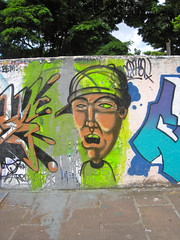And she said yes.
She then proceeded to relate an incident to me that occurred in Porto Alegre last year that happened to be incredibly controversial. Listening initially to the story I kept wondering where the controversial part would come in.
Seems that a kid put graffiti on a wall at the school he attended. Pixou (as in the title) is the past tense of pixar: "to graffiti" more literally "to spray."
He was caught. By the vice-principal of the school who also happened to be his teacher.
As punishment, she made him re-paint the wall. Someone filmed this with their cell phone and posted it. A scandal erupted. Some were on the side of the educator. Some on the side of the law, which she went against when she administered a punishment instead of turning it over to the courts.
So, I'm thinking, "Huh? This a big deal?....Why?"
I kept imagining this happening in the United States. To me it would make sense (and be preferable) that a school deal with an incident like this on their own without calling the police. Jeez, there are just sooo many incidents that could be dealt with by the school without involving a kid in the juvenile justice system who doesn't necessarily need to be there.
When I expressed that reaction, I was told by my colleague that problem was:
The teacher went against the Statute of Children and Adolescents by bypassing the law and dealing with this kid's infractional act on her own terms. Had he gone through the system he would have likely been given six months of community service to perform. In any case, the point is, that this is the law and you've got to follow it.
Still, I wasn't entirely convinced.
Later, my supervisor said that the bigger problem was that the teacher was actually further aggravating the situation by publicly humiliating the 14-year-old boy. She was making him clean the wall in front of other students and was calling him a "fool" and things like that. The other kids were laughing. Apparently the boy was embarrassed and didn't want to go to school after that.
And, in the statute, Chapter II, Article 18, children and adolescents indeed have the right not to be humiliated:
É dever de todos velar pela dignidade da criança e do adolescente, pondo-os a salvo de qualquer tratamento desumano, violento, aterrorizante, vexatório ou constrangedor.After a little searching I found an article (actually the teacher responding to the scandal) that has the video posted (you have to scroll down aways to get to the video).
It is the duty of everyone for the dignity of the child and of the adolescent, putting them in the safety from any inhuman, violent, terrifying, shaming/upsetting, restricting/embarrassing treatment.
To me, it's an awkward situation. The kid does seem quietly embarrassed, pulling his baseball cap down over his eyes. The teacher does seem upset by the mistreatment of the school represented in the kid's actions. And justifiably so - she felt that this kid wasn't respecting limits and wasn't suffering any repercussions for his actions. I wonder if perhaps this was the straw-that-broke-the-camel's-back for her? That maybe this one act on the kid's part was one too many for her?
Still, he would have had some consequences in the court system. And really it does seem that this kid, under law, should not have been subjected to embarrassment. Though, as a side note, I still find it curious this whole thing about 'embarrassment' - I would like to find out what incident(s) caused this to be part of the Statute.
I don't think these responses really leave a person that satisfied as regards this incident. Not me, anyhow. But that's because the debate is much bigger than a response to a kid doing something wrong. It's about how why kids are committing these acts in the first place and what's failing them before that? Unfortunately those questions -- and possible answers -- are huge, multifaceted and complex. Sometimes it feels easier, and less defeating, to stay in the details of one tiny incident, even if it doesn't really solve anything.
Anyone have any opinions or initial gut reactions to this that they'd like to share?





This is a comment I really appreciated that my father e-mailed me this morning about this post that I wanted to share:
ReplyDelete"My initial reaction was that the action by the teacher was appropriate. Then upon reflection I realized that it was totally wrong, even without the law. For me, there are two major reasons, ego and listening. The teacher's ego was caught up in the situation (her control issues with the students, damage to her school, etc.) and the same would apply to most other people in a similar situation. Secondly, the main issue is that the boy is crying out in one of the few ways he knows for attention - for help - for recognition - for love. The reaction to the incident should overstep the damage and go to the heart of the matter - why is the boy acting this way? Your organization is set up to deal with this and the teacher (all teachers) is/are not. The issues are hidden underneath many layers or boundaries that need to be peeled back layer by layer, in a very caring, honest and loving manner, in order to resolve them. What the teacher did was add to the layers. Not only that, she lost more of her authority and diminished the students respect for her."